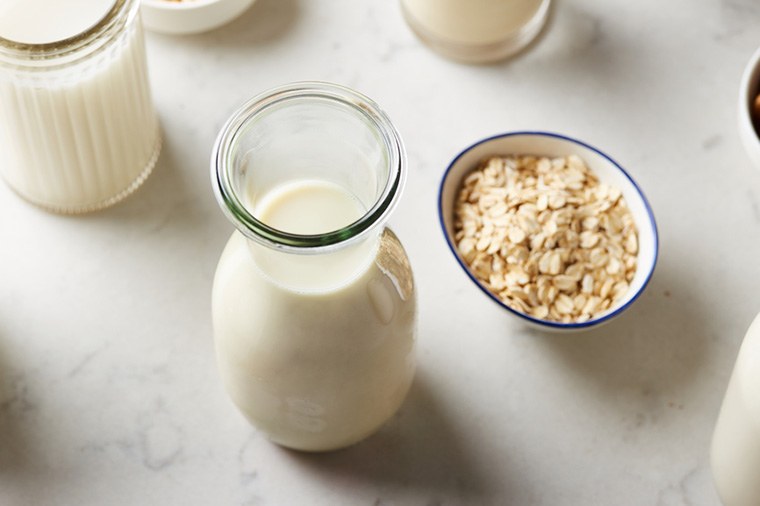Even if you don't have a full-blown intolerance, lactose can still lead to some pretty unpleasant digestive issues like bloating, constipation, and diarrhea. (That pretty much kills all the good vibes in your frothy latte.) Now that almond milk has become the norm—it's even at Starbucks—it's become the go-to substitute for former dairy-lovers (and anyone else wanting to cut back on inflammation). So it can be pretty frustrating when your go-to alternative might still be causing gut probs. What gives?
Some sneaky ingredients in your almond milk (or coconut, if that's more your thing) could be the cause. To get around it, more people are turning to another on-the-rise alt-milk: oat.
Frothier and more full-bodied than nut milk, oat milk tastes a bit closer to cow's milk, and it seems to be more gentle on the gut. Intrigued? Keep reading to find out what's unique about oat milk, as well as how it compares nutritionally to the other alt-milks you'll find at the grocery store.
Should oat milk should be your new dairy-free milk? Here's what you need to know.

The nutritional 411
"When it comes to alt-milks, one isn't necessarily better than the others; they're just different," says nutritionist and registered dietitian Maya Feller, RD. In other words, it depends on what you're going for. There is, however, one ingredient that's universally looked down upon: sugar. Since sugar occurs naturally in oats, even unflavored oat milk can have about eight grams per cup.

{{post.sponsorText}}
But Feller isn't wildly concerned with that. In fact, she says oat milk packs some great benefits other alt-milks don't. "It's been shown that it can reduce LDL-cholesterol because of the beta-glucans" (naturally occurring, immune-system-boosting polysaccharides), she says.
Regardless of what alt-milk you reach for, Feller says if you're looking for one with a robust nutritional profile, your best bet is to go for one that's been fortified, meaning its been enriched with vitamins. "With alt-milks, what most people want is what's found in cow's milk, which is calcium and vitamin D," she says. "To get that from something plant-based, it needs to be fortified."

What's better for your gut
While Feller says it's great some brands add vitamins to their blends, she also points out that not everything that's added is good—including fillers and gums. "This is what can cause digestive distress for some people," she says.
One of the biggest irritants is carrageenan, a common food additive extracted from red seaweed that's often used in almond and coconut milks as an emulsifier. If you experience any digestive problems on the reg, Feller says it's worth steering clear of carrageenan to see if the symptoms go away. Carrageenan isn't something that's used in oat milk typically, which is why many people are finding that it can be easier to digest.
So, is oat milk less likely to cause bloating than almond? It's a huge possibility, but Feller says that in the end, the key—for your gut and overall health—is finding an alt-milk that's as clean as possible. "Real ingredients are easier on your digestive system than anything synthetic or processed," she says. "That's really the most important thing."
If you're still bloated, it might not be your diet at all. This 5-minute exercise has been known to calm the mind and gut.
Loading More Posts...